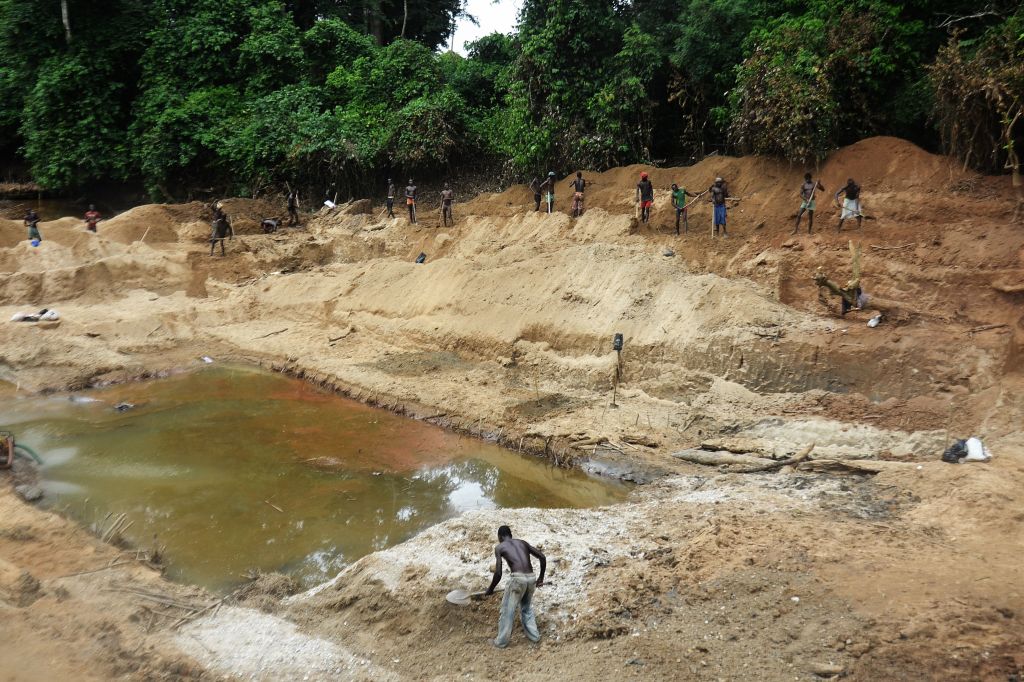ADF STAFF
On the surface, Diamville SAU is a Central African company working in the diamond trade. But Diamville is more than that: It’s the front for a Russian operation selling diamonds from the Central African Republic to finance Russia’s ongoing invasion of Ukraine.
Diamville operates in the Central African Republic (CAR) under the umbrella of Russia’s Africa Corps, the mercenary group formerly known as the Wagner Group. Diamond mining is part of Russia’s strategy to extract valuable resources from African countries, often in exchange for providing military aid through Africa Corps.
Diamville took control of CAR’s diamond industry by using the mafia-like tactics Russian forces have used elsewhere in the country: Local traders sell to Diamville alone or face retribution.
The mining process typically relies on miners working by hand in oppressive conditions in open mines to find raw diamonds they can sell to Diamville, which then moves them onto the international market.
The work of artisanal miners is backbreaking and dangerous. Tunnel collapses are common, costing lives and limbs. Children as young as 12 go to the mines rather than school to help their families earn a living. The open-pit mines despoil the landscape through deforestation and pollute local water sources with runoff. Environmental rules, such as 61-meter buffers along rivers, are routinely ignored, according to environmental groups.
“Productivity and profitability take precedence over working conditions,” journalist Adama Bria wrote recently for the CAR’s Corbeau News. Miners report that Russian supervisors beat, kick, and threaten miners, and are particularly hard on children, Bria added.
CAR President Faustin-Archange Touadéra invited the Wagner Group into his country in 2018 to help put down a rebellion in the east. Wagner and its mining affiliate Lobaye Invest quickly began consolidating control of mining operations across the country to finance their operations while also laundering diamonds and gold on behalf of Russian President Vladimir Putin. Alrosa, another Russian diamond company, has also joined the CAR project.
Diamonds from the CAR are high quality, but the long-running rebellion in the eastern part of the country has put diamonds from there off-limits to the international market under the Kimberley Process, a set of rules intended to guard against so-called “blood diamonds” or conflict diamonds — diamonds whose sale funds combatants. Diamonds from western CAR, where Diamville operates, can be sold internationally under the Kimberley Process.
Diamville diamonds, produced by Russian mines where African miners report human rights abuses, slip through the Kimberley Process, according to Amnesty International. Critics say Russians benefit from a loophole because their diamonds aren’t tied directly to rebellion, despite financing the invasion of Ukraine. Beyond that, diamonds that might violate Kimberley need only to be smuggled across the porous border with the Democratic Republic of the Congo to be relabeled as Congolese diamonds free of Kimberley Process restrictions.
International attempts to have Russian diamonds banned under the Kimberley Process have fallen short. In November 2023, Russia blocked an attempt to revise the Kimberley Process rules on “blood diamonds” with help from the CAR, Belarus and Kyrgyzstan.
Observers say the Kimberley Process needs to take into consideration diamonds whose production finances for broader international conflicts.
“The mining of diamonds to finance international conflicts must also be included in this definition, as it represents a significant threat to global stability and security,” journalist Alvin Aboudou wrote recently in The South African.

